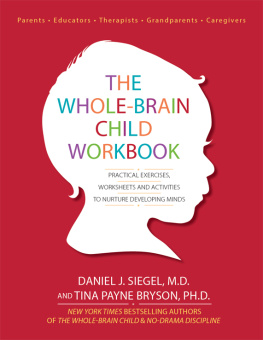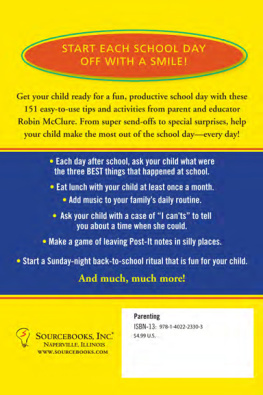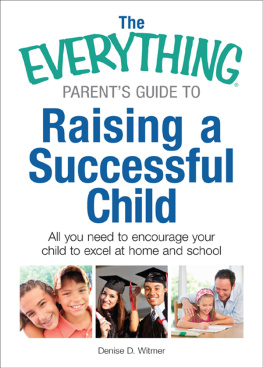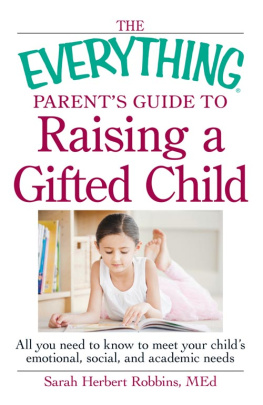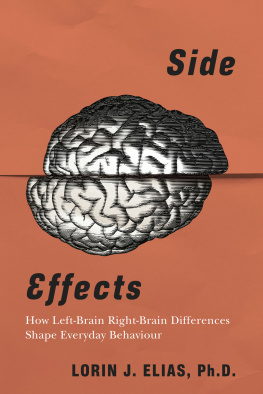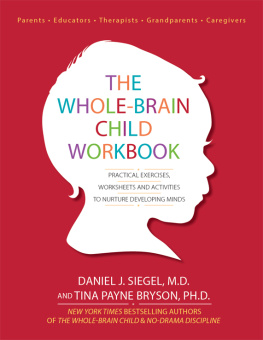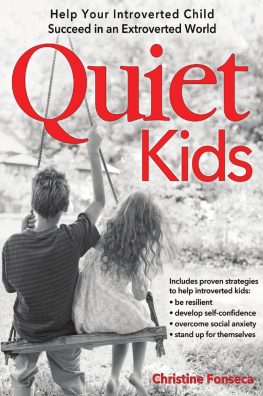A brave, wise, and compassionate guide for parents and teachers of children who, because of their unique styles of thinking and learning, are so often misinterpreted and misunderstood.
Brad Sachs, PhD, author of The Good Enough Child and The Good Enough Teen
This book brims with sound, practical advice for nurturing children who dont fit into the commonly accepted patterns of normal development, yet possess remarkable gifts. A must-read for parents, educators, and mental health professionals.
Michael Gurian, author of Nurture the Nature and The Wonder of Boys
Beals shows parents how to campaign for left-brain friendly education reform, advocate for their socially awkward children, and nurture innate gifts of logic and linear thinking in a society that often favors personal interaction over academic genius.
Exceptional Parent
Beals intelligently and sensitively raises all the right questions about how we need to accommodate square-peg kids and bring out the best in them.
Wellsphere.com
ABOUT THE BOOK
Does your child:
- Have impressive intellectual abilities but seem puzzled by ordinary interactions with other children?
- Have deep, all-absorbing interests or seemingly encyclopedic knowledge of certain subjects?
- Bring home mediocre report cards, or seem disengaged at school, despite his or her obvious intelligence?
If you answered yes to these questions, this book is for you. Author Katharine Beals uses the term left-brain to describe a type of child whose talents and inclinations lean heavily toward the logical, linear, analytical, and introverted side of the human psyche, as opposed to the right brain, a term often associated with our emotional, holistic, intuitive, and extroverted side.
Drawing on her research and interviews with parents and children, Beals helps parents to discover if they are raising a left-brain child, and she offers practical strategies for nurturing and supporting this type of child at school and at home. Beals also advises parents in how best to advocate for their children in todays schools, which can be baffled by and unsupportive of left-brain learning styles.
KATHARINE BEALS, PhD, is an educator and the mother of three left-brain children. A former public school teacher, she is a faculty member of the University of Pennsylvania Graduate School of Education. Her writing on parenting has appeared in Mothering magazine and The Philadelphia Inquirer. She lives in Philadelphia. For more information, visit www.katharinebeals.com.
Sign up to learn more about our books and receive special offers from Shambhala Publications.

Or visit us online to sign up at shambhala.com/eshambhala.
Raising a
Left-Brain Child
in a Right-Brain World
Strategies for Helping Bright,
Quirky, Socially Awkward Children
to Thrive at Home and at School
Katharine Beals, PhD

TRUMPETER
Boston & London
2011
The names of the individuals described in this book have been changed to protect their privacy.
Trumpeter Books
An imprint of Shambhala Publications, Inc.
Horticultural Hall
300 Massachusetts Avenue
Boston, Massachusetts 02115
trumpeterbooks.com
2009 by Katharine Beals
Cover photograph iStockphoto.com/sparkia
All rights reserved. No part of this book may be reproduced in any form or by any means, electronic or mechanical, including photocopying, recording, or by any information storage and retrieval system, without permission in writing from the publisher.
Library of Congress Cataloging-in-Publication Data
Beals, Katharine.
Raising a left-brain child in a right-brain world: strategies for helping bright, quirky, socially awkward children to thrive at home and at school/Katharine Beals.1st ed.
p. cm.
Includes index.
eISBN 978-0-8348-2284-9
ISBN 978-1-59030-650-5 (pbk.: alk. paper)
1. Gifted children. I. Title.
HQ773.5.B425 2009
649.155dc22
2009011382
Contents
Im grateful to the many people who helped me out in various ways and at various stages of this project. For stimulating conversation on key issues and controversies, I thank Suzanne Allen-Weise, Nancy Beals, Sue Bennett, Hilary Bonta, David Bushell, Liz Ditz, Kathy Dowdell, Caroline Ebby, Steve Fischer, Kevin Fisher, Jennifer Freed, Ros Hartigan, Laura Hawley, Laurie Heusner, Heather Hicks, Kathryn Howard, Felicia Hurewitz, Jeanne-Marie, Catherine Johnson, Miles Kronby, Devi Ghosh Mazumdar, Angela McIver, Patricia Moore-Martinez, Manuela Noske, Kim Pelkey, Teresa Pica, Veronica Ramirez, Becky Wall, Judy Weinstein, Shel White, and correspondents at www.kitchentablemath.blogspot.com .
For feedback on various versions of the manuscript, I thank Anne Dubuisson Anderson, Jane Avrich, William Benemann, Nancy Bea Miller, Clara Claiborne Park, Gwynne Sigel, Emily Sims, Mary Jane Thompson, Sheila Tobias, and Caroline Williams. For mathematical feedback in particular, I thank mathematicians Richard Beals, Roger Howe, and Stephanie Frank Singer.
Most especially, for countless hours of their timewhether reading multiple drafts, writing out detailed feedback, combing through thousands of sentences, playing devils advocate, and/or helping me conceptualize and strategizeI thank Emma Jean Baudendistel, Fran Bennett, Jacqueline Raphael, Rachel Simon, Stella Whiteman, and my husband, David.
In addition, I thank Susan Senator for introducing me to my agent, Rosalie Siegel, and Rosalie for her abiding faith, wisdom, and perseverance as this project evolved. Finally, Im tremendously grateful to my editor, Eden Steinberg, for her wise and extensive feedback, and for keeping me focused on my ultimate goal: helping left-brain children in a right-brain world.
Is This Your Child?
I scan the yard, searching for my son. Ms. Johnson, his first-grade teacher, points toward the far corner. Under a maple tree, as far as you can get from all the other kids: a splotch of blond in the dark grass, a faint tangle of pale, skinny limbs. Ms. Johnson shakes her head.
I turn to her. Are you worried about him?
She nods. A little.
I watch her face, her furrowing brow, the flecks of green in her narrow eyes. Hmm... , I say, nodding back. Then I run across the yard, past the kids on the jungle gym, the kids in the sandbox, the kids playing ball on the field. My son sees me and springs up.
What were you doing under that tree? I ask as we head out the gate.
I was dividing seven into twenty. With seven it starts repeating after the sixth decimal2.85714285714285714, and so on.
I smile in awe at my seven-year-old boy.
And did you play with anyone today? I ask, patting his white-blond head.
Not really. He looks up at me with his large, clear-green eyes and smiles.

This book is about a type of bright, quirky child who is often misunderstood and under-appreciated in todays world. To understand, appreciate, and nurture this child, it helps to begin with a fresh, non-judgmental label, and the one I prefer is left-brain. But I dont intend this term literally; that is, I dont wish to imply anything about the activity of brain hemispheres. Rather, Im using the term left-brain in the everyday sense, to convey a specific collection of traits that include thinking abstractly and logically; analyzing and systematizing; processing things linearly (one at a time); attending much more to verbal than to nonverbal communication; preferring to work independently; and being shy, socially awkward, and/or introverted.
Next page


